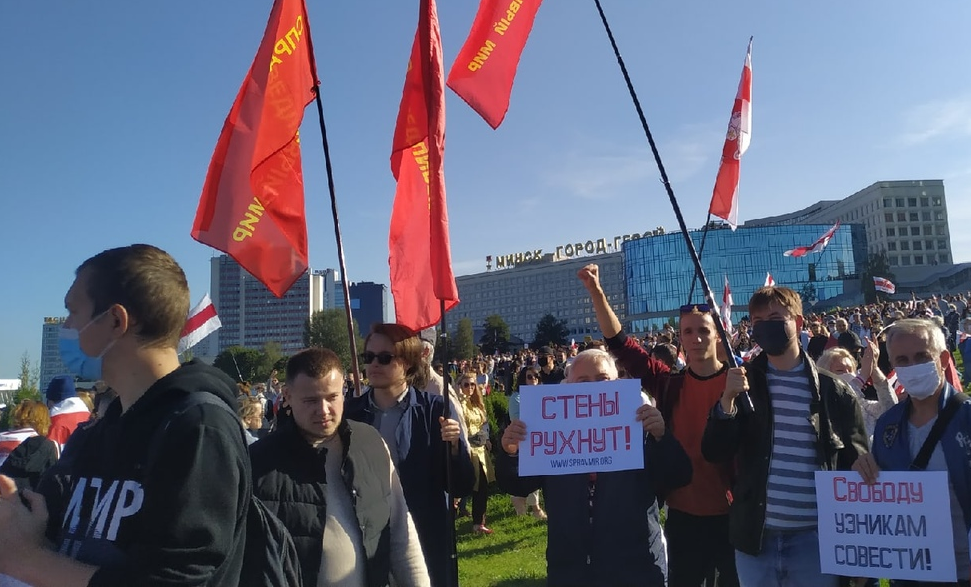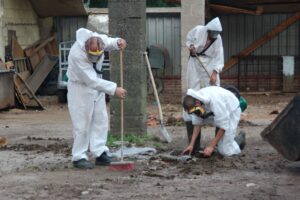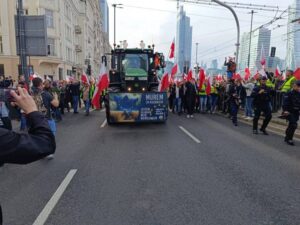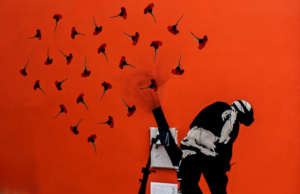Mass protests have been taking place for some months now. Political scientist and member of the Central Committee of the left party Fair World Pavel Katarzheuski speaks about the development of the protest movement, prison and torture, as well as the perspectives of the left opposition.
The interview was conducted by Daniel Schukovits for the Austrian left-wing magazine Volksstimme.
Upcoming: Analysis of the positions of left-wing parties on the protests in Belarus. Soon to be available on the website of transform! europe.
Could you tell us a bit about yourself?
My name is Pavel Katarzheuski and I am 24 years old. I am a member of the Central Committee of the Belarusian Left Party Fair World and one of the leaders of its youth organisation. I have a master’s degree in political science, and the topic of my master’s thesis was the ideological evolution of the communist parties in Europe. For several years now, I have been working in the field of higher education.
To read the interview in Romanian, click here (website of transform! europe’s media partner Baricada).
The current mass protests in Belarus have been going on for almost four months. Where do you find the strength to take to the streets almost daily?
Of course, one of the factors was the completely absurd result for the dictator with 80% of the votes. However, the transformation from quantitative to qualitative is of importance here. From the moment he came to power, Lukashenko began to destroy both democratic rights and social guarantees. Back in about 2005, students, pensioners, and other socially vulnerable groups within the population were deprived of benefits. In addition, a completely slavish system of short-term labour contracts was introduced everywhere. This system allows employers to get rid of employees at any time or put them in an extremely vulnerable position. In recent years, the neoliberal reforms have deepened, and the number of paid services in education and medicine has increased. Overtly draconian economic measures, such as an attempt to impose a tax on the unemployed, have fuelled popular discontent. State property, which still occupies a significant place in the economy, is completely under the control of the bureaucracy and loyal to the regime of the bourgeoisie. All this has happened in the absence of democratic elections, with the destruction of independent trade unions, and so on. In summary, people’s living standards are falling, and they do not have the tools to influence this. In the words of Marx and Engels, people simply have nothing to lose but their chains.
The protests were also a reaction to police terror and the killing of protesters. To date, at least five protesters have been killed, many are missing and some of the missing were later found dead under strange circumstances. If the protests stop, the repression will intensify. We must win in order to protect our freedom and our lives, including our basic right to walk down the street without feeling afraid.
Like many demonstrators, you were in prison for several days. Can you tell us about your experience in prison?
I was detained with several comrades on the way to a peaceful rally. In fact, it was not a detention but a kidnapping. Some people wearing black and unmarked balaclavas just grabbed us, pushed us into a minibus without a licence plate and beat us. We were threatened with murder and told to show them information on our phones. They said they would break our fingers if we refused.
After we were beaten in the minibus, we were transferred to a paddy wagon, which they used to take us to the police station. At the police station, they simply tied our hands behind our backs, threw us face down on the ground and took away all our personal belongings. Many of the detainees’ hands turned black because of the thick plastic ties. The other detainees and I spent 12 or 14 hours outside, lying face down on the ground. The police beat those who tried to talk to each other or who asked for water or medicine. They didn’t even tell us where we were. One of the detainees was disabled and asked for someone to call for medical help. But instead the police beat him until he stopped shouting.
In the morning or in the afternoon, we were pushed into a paddy wagon again and taken to a prison in the city of Zhodino. The transportation was quite humiliating. The paddy wagon was designed to transport around nine people, but there were more than 20 of us. I was lucky because for me they did not find a place in the paddy wagon cell, so they forced me into the platform between the cells, where there was more air. They drove me for two hours on my knees with my hands behind my head. If you have no idea what a paddy wagon looks like inside, it’s something similar to three prison cells inside a van. It was better in prison in the sense that we were not beaten. Yes, the conditions were terrible. There were 24 of us in a cell with eight beds, and the food was more like food waste. There were no hygiene procedures, you could not get any of your belongings, and, naturally, there was nothing to read. They kept us in a complete information vacuum. Most of my cellmates were interesting, kind people, and I want to point out that many of them were detained by accident when they were leaving work or going about their personal business. Just imagine, you are walking down the street to the store, and then, you are simply kidnapped, beaten and taken to jail!
The worst thing was that they did not allow any contact with relatives or comrades, and they wouldn’t say where we were. Nobody knew where we were. For myself, I was worried for the first 20 minutes; the rest of the time, I was worried about my family, friends and comrades who were looking for us in hospitals, police stations and morgues.
The trial took place three days later in prison. The court session lasted five minutes, and the judge simply asked me a few standard questions before sentencing me to five days in jail. However, I and thousands of other people were released one day early due to pressure from protesters.
When I got out of jail, I was impressed that the protests continued and strikes started. Many volunteers stood near the prison, and taxi drivers were ready to take those who had been released to any part of Belarus for free.
When I got out of prison, I went to the hospital to document all my injuries. And what I saw in the hospital defies description. There were young men and women with bruised faces that were black and blue. Many of them could not walk and were in wheelchairs. Then I learned that we were "lucky" to get to Zhodino. In the Minsk prison, the police broke people’s arms and legs, raped men and women with truncheons, and many of those who were in the Akrestsin prison in Minsk did not live to see the dawn.
Do you think that the repressive measures of the regime are having the desired effect? Are people allowing themselves to be intimidated?
The violence sparked a wave of protests in factories, and a spontaneous "women in white" movement began, where women lined the roads in a "chain of solidarity". Violence has turned even many of Lukashenko’s most sincere supporters away from him.
Has anything changed about the protests and their composition since the beginning?
I have to say that this time, for the first time since the 1990s, the working class raised its voice. Although at first the protest looked like some kind of abstract discontent, after the wave of terror, industrial workers began driving the Belarusian protests. It should also be noted that the protests involve those social groups, doctors and teachers, that were previously considered the "backbone of the regime". With the start of the academic year, students have joined the protests too.
In the Western media, mass protests are almost exclusively portrayed as a liberal phenomenon, while Lukashenko’s regime is partly described as communist oriented. What do you think about this and how would you describe the position of the left-wing opposition within the movement?
I have to say, and I’ve said this many times, that Tikhanovskaya and other media figures do not have very much influence among the protesters. The protest is decentralised and is largely self-organised. People with different political views, and sometimes completely depoliticised people, are taking part in the protests, and they all essentially advocate new democratic elections and the dismantling of authoritarianism. In fact, even if the presidential candidate had not been Tikhanovskaya but had been a chair instead, it would have gained more votes than Lukashenko.
As I said earlier, the Lukashenko regime destroyed all possible social and democratic rights, including social guarantees, and how it can be considered communist oriented or left wing in general is not clear.
Although few remember, in the 1990s, Lukashenko came to power with the rhetoric of a typical far-right populist. He frightened people with "red revenge" and "anti-market reforms". He also destroyed the democratically elected parliament, consisting of a large faction of communists and agrarians, which was a faction of our party.
Of course, Lukashenko realised that it was very convenient to use Soviet nostalgia to influence the old electorate, and he did so for 26 years. However, in the distant 1990s, he and his parliamentary faction also voted to ban the Belarusian section of the CPSU. Furthermore, in 1996, the regime organised an artificial split within our party which was then called the Party of Communists of Belarus, and a puppet "communist party" was created. It supports all the authorities’ decisions and is also a propaganda tool that belongs to the regime to show "support" of the dictatorship for the international left movement. By the way, this was one of the reasons why the name was changed to the Belarusian Party of the Left Fair World, in order to avoid any confusion with the second party supporting Lukashenko, which is split from our party.
Recently, there have also been several strikes in state enterprises and industry. How do you think the workers’ resistance will develop further?
Now many strike committees have been crushed, a prison regime has been introduced within enterprises, and workers cannot even move around factories during the working day and contact their colleagues. However, resistance continues and miners are on strike again, with IT workers helping protesters. I would especially like to tell you about the hero of the resistance, miner Yuri Korzun, who chained himself up in a mine, 300 meters below ground, and refused to leave until Lukashenko resigned.
As for the trade unions, the "official" pro-state trade unions in Belarus protect not the employee but the employer. Independent trade unions have been reminiscent of political clubs for many years, as, for all these years, forming their organisations within enterprises has been forbidden. However, now they are trying to mobilise and to use protest mobilisation, helping workers in the fight against the dictatorship.
What is the opinion of the Belarusian left party Fair World about the massive use of the white-red-white flag during the protests? Doesn’t it also show a link to the bourgeois opposition during the period of real socialism and the Nazi occupation?
To be honest, I don’t like this topic, but I want to clarify this discussion. Many people see the white-red-white flag at the demonstrations and perceive it as a symbol of nationalism, anti-communism and almost fascism.
Historically, this flag was drawn by a member of the Belarusian Socialist Party "Hramada" during the February Revolution. This means that, historically, this flag is a symbol of Belarusian social democracy. In the early years of the BSSR (Belarusian Soviet Socialist Republic), there were even plans to make the coat of arms white, red and white, but another option won. Unfortunately, these symbols also have a dark side; the white-red-white flag was used by Nazi collaborators, and then, for several years after the collapse of the Soviet Union, it was a state flag. Since the mid-1990s, it has been associated more with the liberal and nationalist opposition.
To give an example, the colours of the Italian flag were used in Fascist Italy, but no one calls the Italian flag fascist. The same can be said of the Russian national flag, which was used by Nazi collaborators. Of course, I am not a supporter of replacing state symbols and will never hold the white-red-white banner in my hands, but I am glad that it has ceased to be a symbol of national socialism and has become associated with democracy and civil resistance.
If the protests are successful, is Belarus heading for a new republic? What prospects could this open up for the country’s geopolitical situation, which is characterised by tension between the Russian Federation and the EU?
I think if the protests win, the discussion on the geopolitical vector of development may be initiated. But the majority of Belarusians have been, and remain, supporters of close integration with Russia, so this discussion will not achieve anything. I believe that the best result would be the neutral status of Belarus. This provision is in our constitution, and all that remains is to make it come true.
How can the European left and progressive parties in EU countries support your struggle?
Dear comrades, you have already done a great deal with your statements of solidarity. And you continue to do so now.
The "left defenders" of the dictatorship are inflicting colossal damage on the future of the left and the communist movement in Belarus. Just think, people are protesting against repression, murder and falsification, and some left parties are criticising them for this. This could discredit the left in the eyes of workers, students and the entire Belarusian people.
I am asking you to go to the embassies of Belarus in your countries and show them that left forces are always on the side of fair demands by protesters. Tell your comrades, friends and relatives about what is happening in our country. Write letters to the state bodies of Belarus and demand that the violence stop and prisoners be released.
Thank you for what you have done to support us, and please keep on doing it!
Thank you for the interview!



